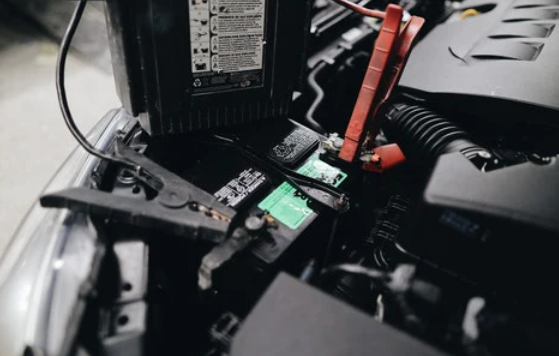Avancées dans la technologie des batteries lithium-ion
Lithium-ion batteries have revolutionized the way we power our devices. From smartphones and laptops to electric vehicles and renewable energy storage systems, lithium-ion batteries have become an essential part of our modern lives. In recent years, there have been significant advancements in lithium-ion battery technology, leading to improvements in energy density, safety, and longevity.
One of the major advancements in lithium-ion battery technology is the development of new materials for the battery\’s electrodes. Traditionally, lithium-ion batteries used graphite as the anode material. However, researchers have discovered that using silicon instead of graphite can significantly increase the battery\’s energy density. Silicon has a much higher theoretical capacity for lithium storage, which means that it can store more energy. This breakthrough has the potential to greatly extend the range of electric vehicles and increase the battery life of portable electronic devices.
Another important advancement is the development of solid-state lithium-ion batteries. Traditional lithium-ion batteries use liquid electrolytes, which can be flammable and pose safety risks. Solid-state batteries, on the other hand, use solid electrolytes, eliminating the need for flammable materials. This improves the safety of the batteries and reduces the risk of thermal runaway, making them ideal for use in electric vehicles and other high-performance applications. Solid-state batteries also have the potential to offer higher energy density and faster charging times.
Researchers are also exploring the use of lithium metal as an anode material. Lithium metal has the highest known theoretical capacity and is lightweight, making it an ideal choice for battery applications. However, the use of lithium metal has been challenging due to the formation of dendrites, which can cause short circuits and reduce the battery\’s lifespan. Recent advancements in lithium metal batteries, such as the use of solid electrolytes and protective coatings, have made significant progress in overcoming these challenges. Lithium metal batteries have the potential to offer even higher energy density and longer lifespan than current lithium-ion batteries.
In addition to advancements in materials, researchers are also focusing on improving the manufacturing processes of lithium-ion batteries. One such advancement is the use of 3D printing technology to produce batteries with complex designs. This allows for greater flexibility in the design of batteries, resulting in improved performance and energy efficiency. 3D printing also reduces the amount of waste generated during the manufacturing process and enables the production of batteries with customized shapes and sizes.

Furthermore, advancements in lithium-ion battery technology are driving the development of renewable energy storage systems. As the world increasingly relies on renewable energy sources like solar and wind, the ability to store this energy for later use becomes crucial. Lithium-ion batteries are well-suited for this task due to their high energy density and fast charging capabilities. With advancements in technology, the cost of lithium-ion batteries has been decreasing, making them more affordable for both residential and commercial energy storage applications.
In conclusion, advancements in lithium-ion battery technology are revolutionizing the way we power our devices and store renewable energy. The development of new electrode materials, solid-state batteries, and lithium metal batteries are improving energy density, safety, and longevity. Furthermore, improvements in manufacturing processes, such as 3D printing, are enhancing the performance and efficiency of batteries. With these advancements, lithium-ion batteries are becoming increasingly important in various industries, and their widespread adoption is expected to continue in the coming years.
-
 Introduction: In recent years, the demand for high-performance batteries has increased significantly due to their application in various industries, including automotive, military, marine, and aerospace. Lithium-ion batteries are considered the most advanced and reliable power source for these applications. Among various types of lithium-ion batteries, the Lifepo4 starter battery is gaining popularity due to its superior performance, high energy density,...En savoir plus
Introduction: In recent years, the demand for high-performance batteries has increased significantly due to their application in various industries, including automotive, military, marine, and aerospace. Lithium-ion batteries are considered the most advanced and reliable power source for these applications. Among various types of lithium-ion batteries, the Lifepo4 starter battery is gaining popularity due to its superior performance, high energy density,...En savoir plus -
 The increasing demand for power storage solutions is driving the development of various energy storage systems, including batteries. Among them, the LiFePO4 lithium battery stood out as a promising option due to its high energy density, long cycle life, and low environmental impact. In this article, we will explore the benefits and applications of the 12V 100Ah LiFePO4 lithium battery...En savoir plus
The increasing demand for power storage solutions is driving the development of various energy storage systems, including batteries. Among them, the LiFePO4 lithium battery stood out as a promising option due to its high energy density, long cycle life, and low environmental impact. In this article, we will explore the benefits and applications of the 12V 100Ah LiFePO4 lithium battery...En savoir plus -
 LiFePO4 batteries are known for their high energy density, long cycle life, and low environmental impact. They are widely used in various applications, from electric vehicles to renewable energy storage systems. However, they are vulnerable to temperature extremes, especially low temperatures. When the temperature drops below a certain level, the battery's performance and lifespan can be significantly reduced. To...En savoir plus
LiFePO4 batteries are known for their high energy density, long cycle life, and low environmental impact. They are widely used in various applications, from electric vehicles to renewable energy storage systems. However, they are vulnerable to temperature extremes, especially low temperatures. When the temperature drops below a certain level, the battery's performance and lifespan can be significantly reduced. To...En savoir plus -
 In the world of energy storage, lithium-ion batteries have been rapidly gaining popularity due to their high energy density and long cycle life. Among them, the 12V 100Ah Lithium Lifepo4 battery has emerged as a high-performance and efficient energy storage solution. In this article, we will explore what makes this battery a superior choice for energy storage. Firstly, let's...En savoir plus
In the world of energy storage, lithium-ion batteries have been rapidly gaining popularity due to their high energy density and long cycle life. Among them, the 12V 100Ah Lithium Lifepo4 battery has emerged as a high-performance and efficient energy storage solution. In this article, we will explore what makes this battery a superior choice for energy storage. Firstly, let's...En savoir plus -
 Introduction: Where technology is an integral part of our lives, having a reliable power solution is crucial. The High Capacity 12V LiFePO4 Battery, with its impressive 100Ah capacity, offers an efficient and long-lasting power solution. This article will discuss the features, benefits, and applications of this battery, highlighting why it is an excellent choice for various power needs. Features:...En savoir plus
Introduction: Where technology is an integral part of our lives, having a reliable power solution is crucial. The High Capacity 12V LiFePO4 Battery, with its impressive 100Ah capacity, offers an efficient and long-lasting power solution. This article will discuss the features, benefits, and applications of this battery, highlighting why it is an excellent choice for various power needs. Features:...En savoir plus -
 With the increasing concerns about environmental pollution and the need for sustainable modes of transportation, electric vehicles have gained significant popularity in recent years. While electric cars have dominated the market, there has been a rising demand for electric bikes as well. Among these, electric dirt bikes have caught the attention of enthusiasts and adventurers alike. One of the key...En savoir plus
With the increasing concerns about environmental pollution and the need for sustainable modes of transportation, electric vehicles have gained significant popularity in recent years. While electric cars have dominated the market, there has been a rising demand for electric bikes as well. Among these, electric dirt bikes have caught the attention of enthusiasts and adventurers alike. One of the key...En savoir plus -
 The rated capacity of a starter battery indicates the amount of energy that the battery can store and deliver to start a vehicle\'s engine. This capacity is typically measured in ampere-hours (Ah) and indicates the amount of current that the battery can provide over a specific period of time. When selecting a starter battery, it is important to choose...En savoir plus
The rated capacity of a starter battery indicates the amount of energy that the battery can store and deliver to start a vehicle\'s engine. This capacity is typically measured in ampere-hours (Ah) and indicates the amount of current that the battery can provide over a specific period of time. When selecting a starter battery, it is important to choose...En savoir plus

